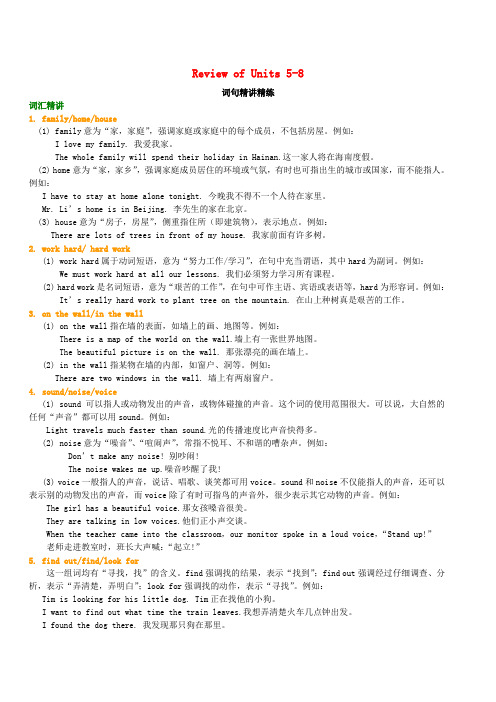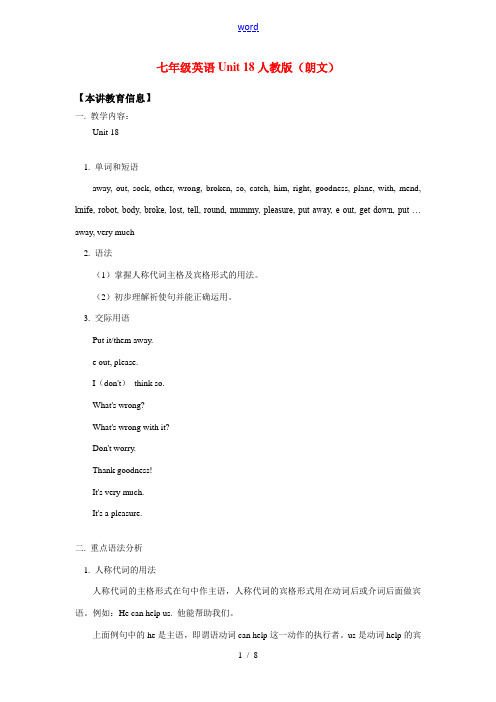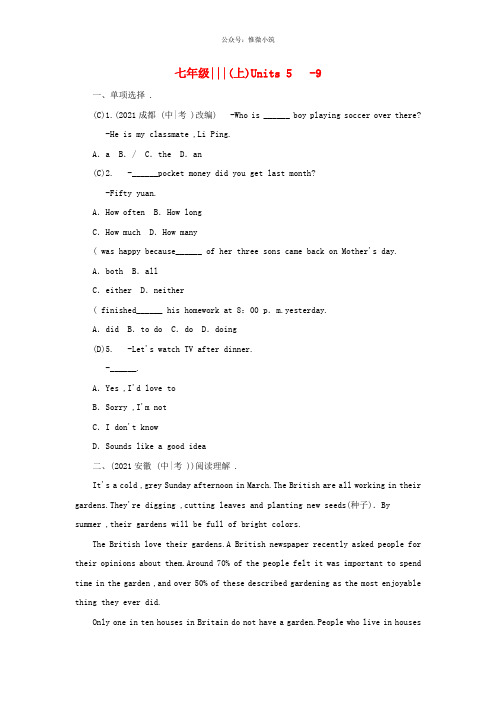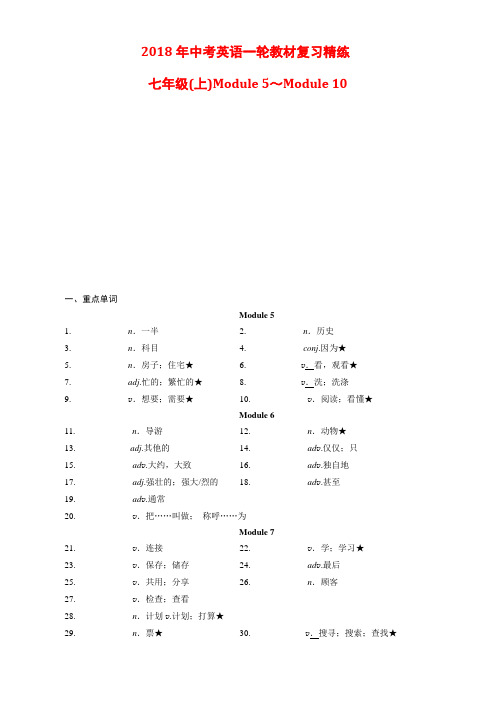人教版英语初一上册18Review of units 5-9词句精讲精练和巩固练习
七年级英语上册 Review of Units 5-8词句精讲精练 (新版)冀教版

Review of Units 5-8词句精讲精练词汇精讲1. family/home/house(1) family意为“家,家庭”,强调家庭或家庭中的每个成员,不包括房屋。
例如:I love my family. 我爱我家。
The whole family will spend their holiday in Hainan.这一家人将在海南度假。
(2) home意为“家,家乡”,强调家庭成员居住的环境或气氛,有时也可指出生的城市或国家,而不能指人。
例如:I have to stay at home alone tonight. 今晚我不得不一个人待在家里。
Mr. Li’s home is in Beijing. 李先生的家在北京。
(3) house意为“房子,房屋”,侧重指住所(即建筑物),表示地点。
例如:There are lots of trees in front of my house. 我家前面有许多树。
2. work hard/ hard work(1) work hard属于动词短语,意为“努力工作/学习”,在句中充当谓语,其中hard为副词。
例如:We must work hard at all our lessons. 我们必须努力学习所有课程。
(2) hard work是名词短语,意为“艰苦的工作”,在句中可作主语、宾语或表语等,hard为形容词。
例如: It’s really hard work to plant tree on the mountain. 在山上种树真是艰苦的工作。
3. on the wall/in the wall(1) on the wall指在墙的表面,如墙上的画、地图等。
例如:There is a map of the world on the wall.墙上有一张世界地图。
The beautiful picture is on the wall. 那张漂亮的画在墙上。
七年级英语Unit 18人教版(朗文)知识精讲

七年级英语Unit 18人教版(朗文)【本讲教育信息】一. 教学内容:Unit 181. 单词和短语away, out, sock, other, wrong, broken, so, catch, him, right, goodness, plane, with, mend, knife, robot, body, broke, lost, tell, round, mummy, pleasure, put away, e out, get down, put … away, very much2. 语法(1)掌握人称代词主格及宾格形式的用法。
(2)初步理解祈使句并能正确运用。
3. 交际用语Put it/them away.e out, please.I(don't)think so.What's wrong?What's wrong with it?Don't worry.Thank goodness!It's very much.It's a pleasure.二. 重点语法分析1. 人称代词的用法人称代词的主格形式在句中作主语,人称代词的宾格形式用在动词后或介词后面做宾语。
例如:He can help us. 他能帮助我们。
上面例句中的he是主语,即谓语动词can help这一动作的执行者。
us是动词help的宾语,即动作的承受者。
又如:Please look after them. 请你照顾他们。
(them是介词after的宾语,也是动作的承受者。
)2. Where is the other one? 另一只(足球袜)在哪儿?(1)other是形容词,意为“其他的,别的”。
指除了已有的以外,其他的不具体的人或物。
例如:①What other things can you see? 你还能看到别的什么东西吗?②Where are his other books? 他其它的书在哪儿?(2)the other可修饰单数名词,也可修饰复数名词。
中考英语教材知识梳理篇七上Units5_9综合精练人教新目标版

七年级|||(上)Units 5 -9一、单项选择 .(C)1.(2021成都 (中|考 )改编) -Who is ______ boy playing soccer over there?-He is my classmate ,Li Ping.A.a B./ C.the D.an(C)2. -______pocket money did you get last month?-Fifty yuan.A.How often B.How longC.How much D.How many( was happy because______ of her three sons came back on Mother's day.A.both B.allC.either D.neither( finished______ his homework at 8:00 p.m.yesterday.A.did B.to do C.do D.doing(D)5. -Let's watch TV after dinner.-______.A.Yes ,I'd love toB.Sorry ,I'm notC.I don't knowD.Sounds like a good idea二、(2021安徽 (中|考 ))阅读理解 .It's a cold ,grey Sunday afternoon in March.The British are all working in their gardens.They're digging ,cutting leaves and planting new seeds(种子).By summer ,their gardens will be full of bright colors.The British love their gardens.A British newspaper recently asked people for their opinions about them.Around 70% of the people felt it was important to spend time in the garden ,and over 50% of these described gardening as the most enjoyable thing they ever did.Only one in ten houses in Britain do not have a garden.People who live in houseswithout gardens often rent(租用) land from the governmentAt first ,only very rich people had gardens.You can still see the gardens around houses with a long history ,such as Chatsworth House or Castle Howard.In the early twentieth century ,however ,gardening became a hobby.People bought different kinds of seeds and plants for their gardens.Although roses ,sunflowers and tomatoes are often grown in British gardens ,they originally(起初) grew wild in other countries.Every year ,there are competitions for the largest vegetables ,but don't expect to win:Britain's__biggest__carrot__is__almost__six__meters__long.(B)1.In summer ,British gardens are often ______.A.full of people digging thereB.colorful with different plantsC.too hot for people to work thereD.covered with grey leaves and plants(A)2.A recent survey showed that ______ of the British felt it important to do some gardening.A.around 70% B.over 50%C.only 20% D.about 10%(D)3.We can infer from Paragraph 4 that ______.A.seeds were provided for freeB.roses were first grown in BritainC.gardening is a hobby in the worldD.the owner of Chatsworth House was rich(B)4.What does the writer mean by the underlined sentence?A.It is easy to grow big vegetables.B.It is hard to win the competition.C.The carrot is much easier to grow.D.The carrot is his favorite vegetable.三、综合填空 .To get a doctharder__(hard) for a person who has cerebral palsy(脑瘫).But Zhang Dakui made it.Zhang ,32 ,was orn__ in a poor family in Henan.When he was little ,a fever gave him cerebral palsy.At the age of 6 ,he could no longer stand up__.His parents tied two bamboo sticks between two trees.Day after day ,he held the stwalking__(行走).Regardless of(无论) heavy snow ,tears or pains ,he stuck to doingthat.5.__Nothing__(anything) could stop him.At 9 ,he was able to walk with__ the help of a walking stick.He overcame all the difficulties at school.In 2006 ,he became a graduate student.His dreams 7.__pushed__(push) him further.He hoped to get a doctorate degree ,but most professors( ,Professor Fan Xiaozhong from Beijing Institute of Technology opened a door for Zhang. "I won't treat you8.__differently__(different).If you can pass the exams all by 9.yourself__ ,you can study with me for your doctor's courses ,〞Fan said.Zhang passed all the exalives__(生命) ,〞Zhang said.四、(2021济宁 (中|考 )改编)完成句子 .There was once a King and he wanted to find out who could paint the best picture of peace.(A)and ,a ,offer ,he ,to ,the ,prize ,would ,artist. Many artists tried.The King looked at all the pictures ,but there were only two he really liked and he had to choose between them.One picture was of a calm(平静的) lake.The lake was a perfect mirror for peaceful mountains all around it.Overhead was a blue sky with white soft clouds.Everyone thought that it was a perfect picture of peace.The other picture had mountains too.But these were rugged(崎岖的) and bare(无遮蔽的).Above was an angry sky.(B)And it__was__raining__and__lightening.Down the side of the mountain ,a waterfall fell quickly.(C)这个看起来一点也不宁静 .But when the King looked carefully ,he saw behind the waterfall a bush(矮树丛) growing in a crack(裂缝) in the rock.In the bush a mother bird had built her nest(巢 ,窝).There, she sat on her nest...in perfect peace.Which picture do you think won the prize?The King chose the second picture. "Because ,〞said the King , "peace does not mean to be in a place where there is no noise ,trouble ,or hardwork.(D)Peace__means__to__be__in__the__middle__of__all__those__things__and__still__be__calm__in__your__heart. That is the real meaning of peace.〞1.连词成句 .请将(A)处的单词连成意义完整的句子 .__And__he__would__offer__a__prize__to__the__artist._2.What did everyone think of the first picture?__Everyone__thought__that__it__was__a__perfect__picture__of__peace._3.句子提问 .请就(B)句的画线局部提问 .__What__ __was__ the weather like?4.汉译英 .根据(C)处中文提示写出英语句子 .(每空一词)This did not look peaceful __at__ __all__.5.英译汉 .请将(D)句译成中文 .__身处如此多的烦扰之中 ,而依然能心存安宁 ,才是真正的宁静 .五、(2021北部湾经济区四市同城模拟)书面表达 .在你所学的科目中 ,你最|||喜欢的科目是什么 ?请你以 "My Favorite Subject〞为题 ,根据以下写作要点 ,用英语写一篇80词左右的短文 .要点提示:1.介绍你最|||喜欢的科目;2.你喜欢该科目的原因;3.谈谈你今后的学习打算 .,可适当发挥 ,增加细节 ,以使行文连贯;2.语篇完整 ,语句通顺 ,语法正确 ,书写标准;3.文中不得出现真实的人名、校名或地名 .My Favorite SubjectIn school we study many subjects.My favorite subject is English.'s widely used in the world.Wherever you go ,you can use it.I can not only learn many new words and phrases but also get the latest news about western countries.Besides ,I can make many foreign friends ,too.In the future ,I will take notes carefully and focus on correct spelling and grammar.When I have some problems with my English ,I will turn to my teachers and friends for help.。
精讲02. 7年级(上)Units 5~9---中考英语复习教材核心词汇知识点精讲精练(人教版)

【直击考点】 ( D )1. (2019·黄石中考)—It’s nearly lunch time. How about having s
noodles and dumplings?
—______.
A. You’re welcome
B. That’s all right
C. That’s nice of you
【句式填写】 1. ——你有足球吗? _D_o_you h__a_v_e_a soccer ball? ——是的, 我有。/不, 我没有。我有一个排球。 Yes, Id_o__. /No,dIo_n_’__t_. I have a volleyball. 2. ——她有一个网球吗? D__o__e_sshe h__a_v_e_a tennis ball? ——是的, 她有。/不, 她没有。她有一个棒球。 Yes,sh__e_ d__o_e_s_. /Nos,he__d_o_e__s_n_’__t. Sheh_a_s_a baseball.
8. ——您要买点什么吗? _C_a_n_I help you? ——是的。我需要买一件毛衣上学穿。 _Y_e__s, p__l_e_a_s_e. I _n__e_e_da sweater for school. 9. 我们卖的所有的衣服价格都很优惠。 We sell all our clotahtevse_r_y_g_o__o_d__p_r_ic__e_s___. 10. ——琳达, 你的生日是什么时候? W__h__e_n__isyour birthday, Linda? ——我的生日是五月二日。 My birthday oisn_M_ _a_y__2_n_d___.
中考英语复习教材核心词汇知识点精讲精练(人教版) 七年级上册 Units 5~9 单击此处添加副标题
2018年中考英语一轮教材复习精练(七上module5~9)含答案

2018年中考英语一轮教材复习精练七年级(上)Module 5~Module 10一、重点单词Module 51. ____________ n.一半2. ____________ n.历史3. ____________ n.科目4. ____________ conj.因为★5. ____________ n.房子;住宅★6. ____________v.看,观看★7. ____________ adj.忙的;繁忙的★8. ____________v.洗;洗涤9. ____________ v.想要;需要★10. ____________ v.阅读;看懂★Module 611. ____________ n.导游12. ____________ n.动物★13. ____________adj.其他的14. ____________ ad v.仅仅;只15. ____________ ad v.大约,大致16. ____________ ad v.独自地17. ____________ adj.强壮的;强大/烈的18. ____________ ad v.甚至19. ____________ ad v.通常20. ____________ v.把……叫做;称呼……为Module 721. ____________ v.连接22. ____________ v.学;学习★23. ____________ v.保存;储存24. ____________ ad v.最后25. ____________ v.共用;分享26. ____________ n.顾客27. ____________ v.检查;查看28. ____________ n.计划v.计划;打算★29. ____________ n.票★30. ____________v.搜寻;搜索;查找★31. ____________ n.信息★32. ____________ad v.有时候;不时Module 833. ____________ n.礼物34. ____________ ad v.从不35. ____________ n.秘密36. ____________ n.杂志37. ____________ n.锻炼;练习38. ____________adj.昂贵的39. ____________v.花(钱);花费40. ____________ n.钱,金钱41. ____________ v.比赛,竞赛42. ____________ adj.担心的;害怕的43. ____________ n.周末Module 944. ____________ v.享受……的乐趣;喜爱★45. ____________ ad v.尽管如此;无论如何46. ____________ v.驾驶;驾车47. ____________ n.饭店;餐馆★48. ____________ n.(某事发生的)时刻,时候49. ____________ n.地点★50. ____________ad v.仍然,依旧51. ____________adj.大部分(的);大多数(的)52. ____________v.学习;研究★Module 1053. ____________ n.节日★54. ____________ v.打扫adj. 清洁的;干净的★55. ____________ v.烹调;煮;烧★56. ____________ v.发生★57. ____________ ad v.十分;相当58. ____________ v.参加;加入★59. ____________ v.庆祝60. ____________ n.(电视)节目★61. ____________ v.意思是;意味着二、词汇拓展1. begin v.开始★→____________(过去式)→____________(过去分词)2. make v.做,制作★→____________(过去式/过去分词)3. live v.生活;住→____________adj.活泼的;轻快的4. come v.来★→____________(过去式)→____________(过去分词)5. catch v.抓住;接住★→____________(过去式/过去分词)6. send v.发送★→____________(过去式/过去分词)7. use v.使用→____________(过去式/过去分词)adj. 有用的→____________8. cut v.切;剪→____________(过去式/过去分词)→____________(现在分词)9. give v.给;送★→____________(过去式)→____________(过去分词)10. sing v.唱;唱歌→____________(过去式)→____________(过去分词)11. choose v.选择;挑选→____________(过去式)→____________(过去分词)→____________n.选择12. wear v.穿;戴→____________(过去式)→____________(过去分词)13. hear v.听见★→____________(过去式/过去分词)14. lie v.躺;平躺→____________(过去式)→____________(过去分词)→____________(现在分词)15. leave v.离开→____________(过去式/过去分词)16. run v.跑,奔跑★→____________(过去式)→____________(过去分词)17. sweep v.打扫;清扫→____________(过去式/过去分词)18. speak v.说话;讲话★→____________(过去式)→____________(过去分词)→____________n.说某种语言的人19. tell v.讲;告诉★→____________(过去式/过去分词)20. think v.想;认为★→____________(过去式/过去分词)21. love n. & v.爱,热爱;喜爱,关爱→____________adj.令人愉快的;可爱的22. sleep n. & v.睡觉★→____________(过去式/过去分词)→____________adj.困的;瞌睡的→____________adj.睡着的23. interest n. & v.兴趣;对……感兴趣→____________ adj.有趣的→____________ adj.感到有趣的24. Africa n.非洲→____________ n.非洲人;adj.非洲的25. country n.国家→____________(pl.)★26. leaf n.叶子→____________(pl.)27. mouse n.鼠标;老鼠→____________(pl.)28. danger n.危险→____________ adj.危险的29. fun n.有趣→____________ adj.有趣的30. luck n.幸运→____________ adj.幸运的31. tradition n.传统→____________ adj.传统的★32. beauty n.美丽→____________ adj.美丽的33. music n.音乐→____________ n.音乐家→____________ adj.音乐的34. different adj.不同的→____________n.不同35. difficult adj. 困难的,难懂的→____________ n.困难三、重点短语1. ________________上学2. ________________起床3. ________________吃早餐4. ________________吃饭,吃晚饭5. ________________回家6. ________________上床睡觉7. ________________开始睡觉;入睡8. ________________吃午餐9. ________________比如10. ________________来自11. ________________看12. ________________在那边,在那里13. ________________少量14. ________________并且,还15. ________________全世界16. ________________擅长17. ________________许多种类18. ________________打开19. ________________搜寻;查找20. ________________在周末21. ________________收到……的来信22. ________________拍照23. ________________等待,等候24. ________________一些;几个25. ________________正在出售26. ________________回去27. ________________下(飞机、火车、公共汽车等)28. ________________为……做好准备29. ________________此刻,目前30. ________________在工作31. ________________收起;收拾好32. ________________赶快33. ________________扫去34. ________________把……连接到……四、重点句型1. I get up ______ half past seven______ the morning, and then ______ breakfast. 我早晨7:30起床,然后吃早餐。
Review of Units 1-5 知识讲解

Review of Units 1-5词句精讲精练词汇精讲1. anywhere interestinganywhere interesting中interesting作后置定语,修饰不定副词anywhere。
由some / any / no / every /与body / thing或where等构成复合不定代词或不定副词时,其修饰词常后置。
例如:I want to move somewhere else. 我想要搬到别的地方去。
He has something important to say. 他有重要的话要说。
【拓展】常用的复合不定代词有:somebody; someone; something; anybody; anyone; anything; nobody; nothing; everyone; everybody; everything等。
不定代词有两种用法:一是作主语时,相当于单数第三人称;一是被形容词修饰,形容词常作后置定语。
例如:Everyone is here. 人人都在这里。
I’ll buy you something new. 我要给你买些新东西。
2. What about…?What about意为“……怎么样?”,可用来询问有关情况、提出建议或征求意见等。
about是介词,后面接名词、代词或动名词,即:what about + sb./sth. (可接表示人或物的名词及代词)what about + doing sth.例如:What about sitting in the garden? 在花园里坐坐怎么样?I’m going to the park. What about you? 我要去公园,你呢?What about your exam last week, Tom? Tom,你上周考试怎么样?【拓展】What about…?与How about通常可以互换,后接名词、代词或动名词,但不能接动词不定式或动词原形。
七年级英语上册ReviewofUnits5_8词句精讲精练
Review of Units 5-8词句精讲精练词汇精讲1. family/home/house(1) family意为“家,家庭〞,强调家庭或家庭中的每个成员,不包括房屋。
例如:I love my family. 我爱我家。
The whole family will spend their holiday in Hainan.这一家人将在海南度假。
(2) home意为“家,家乡〞,强调家庭成员居住的环境或气氛,有时也可指出生的城市或国家,而不能指人。
例如:I have to stay at home alone tonight. 今晚我不得不一个人待在家里。
Mr. Li’s home is in Beijing. 李先生的家在北京。
(3) house意为“房子,房屋〞,侧重指住所〔即建筑物〕,表示地点。
例如:There are lots of trees in front of my house. 我家前面有许多树。
2. work hard/ hard work(1) work hard属于动词短语,意为“努力工作/学习〞,在句中充当谓语,其中hard为副词。
例如:We must work hard at all our lessons. 我们必须努力学习所有课程。
(2) hard work是名词短语,意为“艰苦的工作〞,在句中可作主语、宾语或表语等,hard为形容词。
例如:It’s really hard work to plant tree on the mountain. 在山上种树真是艰苦的工作。
3. on the wall/in the wall(1) on the wall指在墙的外表,如墙上的画、地图等。
例如:There is a map of the world on the wall.墙上有一张世界地图。
The beautiful picture is on the wall. 那张漂亮的画在墙上。
人教版初一(上)英语第18讲:unit 9 语法篇(教师版)
人教版初一(上)英语第18讲:unit 9 语法篇(教师版)Unit9语法篇____________________________________________ __________________________________________________________________________________ ______________________________________1.熟练掌握特殊疑问句的基本用法特殊疑问句1. 特殊疑问句是对句中某一部分内容提出疑问的问句,是指以what, who, when, where, why, how 等开始的疑问句,也称wh-疑问句。
特殊疑问句与一般疑问句不一样,它不能用yes或no回答。
2. 结构(1) 倒装结构:疑问词+一般疑问句语序?(2) 陈述语序:疑问词+谓语+宾语/状语?用陈述语序的结构往往是对主语进行提问,这时疑问词作句子的主语。
3. 疑问词小结(1) 什么都要问的what—Why do you like Beijing Opera? 你为什么喜欢京剧?—Because I think it is very interesting. 因为我认为它很有趣。
Why don’t you go to work a little earlier?你为什么不早点儿去上班?(4) 爱问时间的whenwhen是疑问副词,意为“什么时候,何时”,回答when引导的特殊疑问句,可以是笼统或具体的时间,而回答what time引导的问句,则要说出具体的时间点。
—When is your mother's birthday? 你妈妈的生日是什么时候?—It on September 20th. 是在9月20日。
—What time is it? 几点了?—It's 10:20. 10点20。
单项选择1.(2019湖北孝感孝南期末)---Why do you like science ?--- it’s difficult interesting .A. So; butB. Because ; andC. So; andD. Because ; but2.(2019山东德州中考)--- are you going to buy for your father for Father’s Day ?---A T-shirt .A. WhatB. WhenC. WhereD. How3.(2019重庆中考)--- does your cousin usually go to work on foot ?---He says it’s good for his health.A. WhereB. WhenC. WhyD. How4.---(2019湖南广义试验中学月考)---What’s the of the red shoes ?---$56.A. colorB. priceC. number5.(2019广西玉林博白期末)--- is your father ?---He’s forty .A. WhenB. How oldC. WhatD. How6.(2019江西广丰试验中学“诺贝尔”奖挑战赛)--- do you like Monday ?---We have music on Monday. You know , I like music very much .A. WhatB. WhyC. WhenD. How7.(2019新疆巴州蒙古族中学期中)--- is your school trip ?---It is on December 19th.A. HowB. WhatC. WhenD. Where解析及答案:1. 根据why可知,这是询问原因,因此答语要用连词because给出原因;第二个空格前后两个词difficult(困难的)和interesting(有趣的)是转折关系,要用but连接。
人教版英语七年级上册:ReviewUnit5~Unit9教学设计
3.句型:通过情境对话、角色扮演等形式,使学生熟练运用所学句型进行日常交流,包括介绍自己、询问他人、描述事物等。
4.听说:培养学生在日常生活中运用英语进行有效沟通的能力,提高学生的听力水平和口语表达能力。
2.歌曲结束后,教师提出与歌曲相关的问题,如:“What's the song about? Can you find any words related to family or school?”引导学生积极思考,复习相关词汇。
3.结合学生的回答,教师自然导入新课:“Today, we will review what we have learned from Unit5 to Unit9, focusing on family, school, transportation, weather, and colors.”
1.学生年龄特点:七年级学生正处于青春期,思维活跃,好奇心强,对新事物充满兴趣。因此,在本章节教学中,教师应注重激发学生的兴趣,设计富有挑战性和趣味性的教学活动。
2.英语基础:经过前四个单元的学习,学生已掌握了一定的词汇、语法和句型,具备初步的英语听说读写能力。但在复习过程中,学生可能对部分知识点存在遗忘现象,教师应关注学生的薄弱环节,有针对性地进行巩固。
人教版英语七年级上册:ReviewUnit5~Unit9教学设计
一、教学目标
(一)知识与技能
在本章节的教学中,我们将围绕人教版英语七年级上册的Review Unit5至Unit9的内容,帮助学生巩固和拓展以下几个方面的知识技能:
1.词汇:通过复习,使学生掌握Unit5至Unit9的重点词汇,包括家庭、职业、学校设施、交通工具、天气、颜色等,同时学会运用这些词汇进行简单的交流。
人教版七上英语Review_of_Units_1-4_同步精讲精练(原卷版)
Review of units 1-4一、词汇精讲1. on(1)on用来表示时间时,表示具体到某一天的时间。
例如:on Sunday 在周日on the morning of Friday 在周五的早上(2)on用来表示方位时,意为“在……之上”。
例如:Your book is on the desk. 你的书在桌子上。
(3)on还可以表示“通过(某种方式)”。
例如:I study English on the radio.我通过收音机学英语。
拓展:in the tree 与on the tree的区别in the tree 表示外来的事物,不是树上长出来的。
on the tree是树上长出来的。
例如:There is a cat in the tree. 树上有只猫。
There are some apples on the tree. 树上有些苹果。
2. it’s&itsit’s 是it is的缩写,意为:“它是”。
例如:It’s a book. 它是一本书。
its 是物主代词,意为:“它的”。
例如:its hands 它的手3. this&that; these&those这四个词是指示代词。
this,that是单数形式,意为:“这个,那个”;these, those 是复数形式,意为:“这些,那些”。
this 和these 表示近指,指近处的事物;that和those表示远指,指远处的事物。
例如:This is a black cat. 这是一只黑猫。
That is a yellow bike. 那是一辆黄色的自行车。
These are some apples. 这是一些苹果。
Those are some peaches. 那是一些桃子。
4. no&not(1)no可以用来回答一般疑问句,但是not不可以。
not可以和助动词等缩写,但是no 不可以。
例如:-Do you like going swimming? 你喜欢游泳吗?-No, I don’t. 不,不喜欢。
- 1、下载文档前请自行甄别文档内容的完整性,平台不提供额外的编辑、内容补充、找答案等附加服务。
- 2、"仅部分预览"的文档,不可在线预览部分如存在完整性等问题,可反馈申请退款(可完整预览的文档不适用该条件!)。
- 3、如文档侵犯您的权益,请联系客服反馈,我们会尽快为您处理(人工客服工作时间:9:00-18:30)。
Review of units 5-9词汇精讲1. interesting 和interestedinteresting和interested都是形容词。
但是interesting表示某物本身有趣,多用来修饰物;而interested着重于被动意义,指人的感受,常用于“be interested in…”结构,意为“对……感兴趣”。
例如:The English class is very interesting. 英语课很有趣。
She is interested in English movies. 她对英文电影很感兴趣。
2. watchwatch既可以做动词也可以做名词。
作动词时,意为“看”。
常指看节目、比赛等。
作名词时,意为“手表”。
例如:She usually watches TV after supper. 她晚饭后通常看电视。
I have a beautiful watch. 我有一块漂亮的手表。
3. soundsound既可以做动词也可以做名词。
作动词时,常作连系动词表示“听起来”,后跟形容词作表语。
做名词时意为“声音”,指自然界的各种声音。
例如:Your idea sounds good. 你的主意听起来不错。
At midnight he heard a strange sound.半夜里他听到一种奇怪的声音。
4. play1)play用作及物动词时,有“打,踢,拉,弹(乐器)”等意思。
当后面跟球类名词时,名词前不加冠词;当后面跟乐器类名词时,名词前加the。
例如:Can you play basketball? 你会打篮球吗?Can you play the piano? 你会弹钢琴吗?2)play 做不及物动词时意为“玩”,后面接宾语时常加介词with。
例如:Don’t play with the fire; it’s dangerous. 不要玩儿火,那很危险。
3)play 做名词时意为“游戏, 玩耍,娱乐,戏剧”等意。
例如:All work and no play isn't a good thing. 只工作不玩耍不是件好事。
5. eat&have做“吃”讲时,eat和have常可互换。
但是eat 可用作不及物动词,后面不跟宾语,have 不可以。
例如:I eat (have) a hamburger every morning. 我每天早上吃一个汉堡。
We eat well at school. 我们在学校吃的很好。
注意:“吃药”习惯说“have(take) medicine”,不说“eat medicine”。
拓展:have 有个多意词,除了当“吃、喝”讲,还可以翻译成“有”,或者不翻译;并且还可以做助动词用来构成时态。
例如:I have a new watch. 我有块新手表。
(有)Let’s have a look.让我们看一看。
(没有实际意义)I have been there before. 我之前去过那里。
(用来构成现在完成时)6. well&goodgood和well都是“好”的意思。
但是well是副词,用于修饰动词。
good是形容词,用作定语或表语。
well也可以作形容词,但表示身体状况良好。
例如:She is a good girl. 她是个好女孩儿。
She speaks English well. 她英语说的好。
I hope you will be well soon. 我希望你能很快好起来。
7. no&not1)no 表示“不”,修饰可数名词单数时no=not a; 修饰可数名词复数或者不可数名词时no=not any。
例如:She has no book.=She doesn’t have a book. 她没有书。
There are no books on the table.=There aren’t any books on the table. 桌子上没有书。
There is no water in the bottle. = There isn’t any water in the bottle. 瓶子里没有水。
2)no 常用来做否定回答,与yes相对应,not不可以。
例如:-Do you like bananas? 你喜欢香蕉吗?-No, I don’t. 不,不喜欢。
(正确)-Not, I don’t.不,不喜欢。
(不正确)3)not 用于否定句,放在助动词或者be动词后面表示否定,no 不可以。
例如:我们可以说She doesn’t like tea. 不可以说She does no like tea.8. and&orand 和or都是连词,可以表示“和”的意思;都可以用来连接并列的语法作用相同的成分。
但是and经常用在肯定句中,or常用于否定句或者疑问中,有时可以用来连接并列的选项构成选择疑问句。
例如:They are both teachers. 他们都是老师。
I don’t like pears or oranges. 我不喜欢梨和橘子。
Do you like apples or bananas? 你喜欢苹果还是香蕉?拓展:or还有“否则”的意思。
例如: Hurry up, or you’ll be late for school .快点,否则你要迟到了。
9. salesale是名词,它的意思是“出售、廉价出售”,常与介词on或者for搭配。
on sale表示“出售/(特价)销售”;for sale表示“待售”。
例如:There are some clothes on sale in the supermarket. 商场有些衣服在促销。
The car is for sale. 这辆车待售。
10. how much &how manyhow much和how many是同义词组,意为“多少”;用来询问物体的数量。
但是how much 用来提问不可数名词的数量,后跟不可数名词;how many 用来提问可数名词的数量,后跟可数名词复数。
此外,how much还可以提问物体的价格,但是how many不可以。
例如:How much water is there in the glass? 杯子里有多少水?How many books are there in your school library? 你们学校图书馆有多少书?How much is the car? 这辆车多少钱?11. in red介词in和表示颜色的名词连用,常可以表示“……颜色的……”。
例如:I have many shoes in black. 我有很多黑色的鞋。
另外“in+表示颜色的名词”还可以表示“穿着/戴着什么颜色的……”。
例如:The girl in blue is my sister. 那个穿蓝色衣服的女孩是我的妹妹。
12. in, on, at介词in ,on 与at都可以用于时间前,此时它们的区别是:in 后常跟年,月,季节,周等,也用于表示泛指的上午,下午,晚上。
例如:in winter 在冬季in the afternoon 在下午in January 在一月It is usually cold in winter. 冬天天气通常很冷。
We have English class in the morning every day. 我们每天上午有英语课。
on 后常跟具体的某一天,或者跟表示某一天的上午,下午,晚上等的词。
例如:on Sunday 在星期天We are very happy on Children’s Day. 儿童节那天我们很开心。
at后常跟某个具体的时刻点。
例如:at 7:00 在七点钟at the moment 在此刻13. because&because ofbecause of和because是同义词,都可以表示原因,但是,because的后面接句子;because of的后面接名词、代词或者动名词短语等。
例如:I was late for school because it was raining heavily. 我迟到了,因为雨下的很大。
I was late for school because of the heavy rain. 我因为大雨而迟到了。
14. from… to“from…to…”是英语中极其常用的介词短语,表示“从……到……”,其用法很多,搭配能力也很强。
可以连接两个不同的地点、时间、数字等。
例如:I go to school from Monday to Friday. 我从周一到周五去学校。
Count from one to ten. 从一数到十。
词汇精练I.英汉互译。
1. from…to…_______2. 对……感兴趣________3. 因为(词组)________4. play football _______5. on sale_________6. 在星期日________7. 在星期二__________ 8. have breakfast__________ 9. 手表_________10. how much __________Ⅱ. 根据句意和首字母提示完成句中单词。
1.L_______ go to school.2.There is an English c_______ in our school.3.-Do you often p_______ tennis? -Yes, I do.4.I can’t play soccer. It’s too d______.5.My family often w_______ TV at home in the evening.6.The song s________ beautiful.7.M________ people like the story.8.Grapes(葡萄) from Xinjiang are on s_______.9.His f_______ food is chicken.10.Jeff is very interested in science, and he wants to be a______ (science).III. 用所给词的适当形式填空。
1.There are ______ (much) things in the supermarket.2.There is a ______ (sport) meeting in our school this week.3.Jack _______ (have) a basketball.4.They _______ (play) soccer every day.5.______ he ______ (watch) TV every day?6.This is an _______ story and all of us are _______ in it. (interest)7.-Well, let’s play basketball. -That ______ (sound) good.8.Tom and I _______ (be) friends.9.______ your brother _______ (like) French fries?10.Let’s ______ (have) some fruit.IV. 听力链接。
